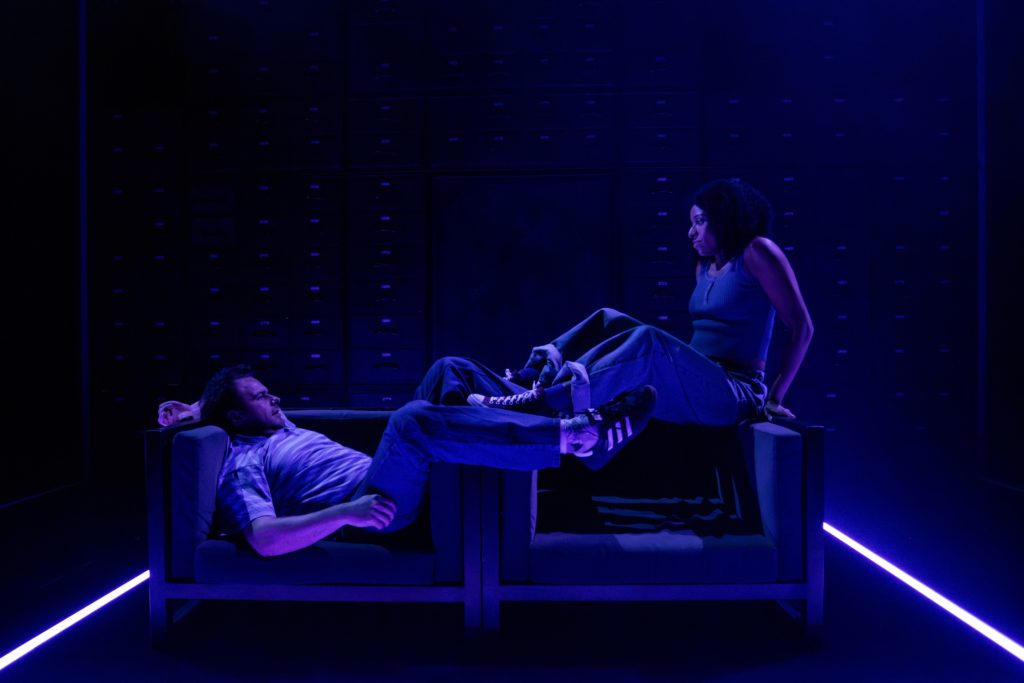
Intertwined: Joe Layton’s Robbie and Hannah Sinclair Robinson’s Jess in Frantic Assembly’s Lost Atoms. Picture: Scott Graham
RELATIONSHIP two-handers keep popping up on the York Stage in recent years, just as Normal People and One Day’s young lovers top the TV viewing charts.
First, in March 2022, came the multiple universes in Black Treacle Theatre’s York premiere of Nick Payne’s Constellations at Theatre@41, Monkgate, where each scene, such as the first meeting, the first date and breaking up, unfolds in several different ways, showing how nothing is necessarily ‘meant to be’, not least a crisis that could mean the end of their time together.
Next, in November that year, White Rose Theatre staged The Last Five Years, Jason Robert Brown’s sung-through American musical with the novel structure of struggling actress Cathy telling her side of the story from the end of the relationship backwards, while, at the other end of the stage, successful young novelist Jamie does so from the start forwards, as he lands a publishing deal at 23.
Now comes physical theatre specialists Frantic Assembly’s boy-meets-girl tale, or enervated man meets sparky younger woman, if you prefer, in the London company’s 30th anniversary show in a co-production with Curve, Leicester, Mayflower, Southampton and the Lyric, Hammersmith.
Payne and Brown’s works were both festooned with multiple awards. Anna Jordan’s Lost Atoms is at least their equal and could well be the best of the three in terms of capturing the essence of a life-changing relationship through physicality. When words fail, physical expression takes over, much like how discord in discourse leads to outbursts of singing in opera and musical theatre.
In this truly memorable memory play, the present keeps being interrupted, even elbowed aside, by recollections of a past that began with a chance meeting, sharing a mobile hotspot, in a cafe where Jessie (Hannah Sinclair Robinson) had temped for four years. So stop-starts a run of awkward dates with Robbie (Joe Layton), but gradually blossoming love too.
Is this the stuff of fairy tales, asks Jordan, or maybe of grimmer tales that avid researcher Jess bemoans have had their guts pulled out? Recollection by recollection, it becomes apparent that both protagonists/antagonists are remembering their version of the past in accounts that differ. Whose version should we trust, where does the truth lie and why do we need to re-write and embellish what has gone before – and to keep re-writing it every time we recall it? Maybe because the truth is too painful?
Do Jess and Robbie doubt each other or, increasingly, doubt themselves? Can there be a reliable witness in matters of the heart and do we ever really understand love?
For all the clash of present and past, symbolised by flashes of light and soundwaves, everything is played out in chronological order: love’s vicissitudes; connection and disconnection; Robbie’s preference for staying in, Jess’s need for night outs; parental relationships and pregnancy; infidelity and Robbie’s request of this reunion meeting.
Jordan’s text, as full of frank humour as much as heartbreak, is seductive and insightful in its own right as she explores how two people’s “perceptions of romantic love affected their experiences”, but works all the better for its symbiosis with Frantic’s theatrical house style. Or, as she puts it, “I am drawn to Frantic’s extraordinary ability not just to tell a story but to create feeling on stage.
“I’m always trying to find words for the things that seem impossible to describe, and I love to watch Frantic find language to describe these things through movement.”
Movement that, in the process, really lifts the impact of the language – and I do mean ‘lifts’. Scott Graham’s movement direction plays out on Andrzej Goulding set, dominated by a towering wall of filing cabinets that serves as a climbing frame for Layton’s Robbie and Sinclair Robinson’s Jessie to go clambering hither and thither, to almost dizzying effect at times, as they express a multitude of emotions from giddy joy to guttural pain, playful fun to vulnerable fall-outs, cautious start to implosive finale.
A floor drops out of the structure like a modern-day drawbridge, for sensual bedroom scenes and scrambling precipice friction alike. Drawers open, sometimes to be used as seats, more often for access to props, clothing, photos, mementoes of childhood and past pursuits that serve as welcome or unwelcome memory triggers and glowing light bulbs that set off new patterns of thoughts. Two armchairs complete the set, theatrically large to emphasise how their every reconfiguration carries significance.
Layton and Sinclair Robinson had worked together previously in Frantic’s Othello and Metamorphosis and that familiarity oozes through their kinetic, magnetic performances in Lost Atoms as, in Jordan’s words, they “recreate the extraordinary energy of falling in love, in a way that is recognisable and palpable for the audience.”
How right she is. Lost Atoms is a love story familiar in its course and feelings, but told in a thrillingly bold way, with feeling, energy and infinite hope from lessons learned for the next wall to climb, the next life file for the cabinet.
Frantic Assembly in Lost Atoms, York Theatre Royal, until Saturday, 7.30pm plus 2.30pm Saturday matinee. Box office: 01904 623568 or yorktheatreroyal.co.uk.
